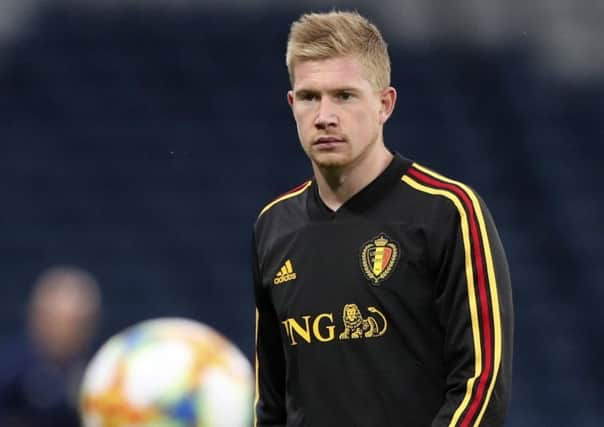Belgium superstar Kevin De Bruyne urges Scotland to be patient


The Manchester City player was instrumental in re-igniting that age-old debate when he created three goals and scored the other in Belgium’s 4-0 win at Hampden Park on Monday. The result prompted even manager Steve Clarke to write off the Scots’ chances of qualifying automatically for Euro 2020.
While there’s still the opportunity of securing a place through a play-off, the meek surrender in Group I, where the Scots have also lost to Kazakhstan and Russia, means spirits are as low as ever among the ranks of the Tartan Army.
Advertisement
Hide AdAdvertisement
Hide AdDe Bruyne can see similarities with Belgium, who hit rock bottom just over ten years ago after three successive failed qualifying campaigns. They were to go through another two failed attempts to reach a major finals before there was tangible evidence that things were starting to improve.
The Belgian version of performance schools started to yield results several years ago. De Bruyne is one of those who came through a system where clubs collaborated with local schools. He made his international debut in August 2010 in a defeat to Finland. Yes, a defeat to Finland. It seems unthinkable that could happen now, with the golden generation of Belgian footballers having bedded in.
Just as it was once unthinkable for Scotland to lose 3-0 to a team ranked 117th in the world, as happened in Kazakhstan at the start of the current campaign. Nevertheless, De Bruyne has offered some words of encouragement.
“It’s similar to when I started with the national team,” recalled De Bruyne. “Ten years ago, we had troubles in terms of finding the right balance, the right team. There was a long time when we didn’t qualify for anything. I actually think Scotland have some really good players. They are trying to find a concept which will help them perform well as a team.”
Belgium’s success did not happen overnight. They eventually made it to the 2014 World Cup finals under manager Marc Wilmots, pictured below left, from a qualifying section that included Scotland (who finished fourth).
The Red Devils reached the last eight in Brazil and the quarter-finals again at Euro 2016. Last year they reached the last four of the World Cup in Russia. They are already among the favourites to lift the Euro 2020 title. All because they changed tack under technical director Michel Sablon, pictured inset, who was allowed to persist with his methods after being appointed in the early 2000s.
He advised investing in eight new performances centres with the profit the Royal Belgian FA made from co-hosting Euro 2000. He also insisted that all national youth teams would start playing 4-3-3. This is the environment from which De Bruyne and others sprang.
“It takes time,” said the midfielder. “Obviously, you guys have had some great times before. You need to show some patience and the manager has to find balance within the team.”
Advertisement
Hide AdAdvertisement
Hide AdLike team-mate Romelu Lukaku, who said he has been impressed with the likes of Scott McTominay and Oli Burke, De Bruyne believes he can see the stirrings of a revival. Few Scots might share his optimism but De Bruyne does at least know what it takes to be at the heart of a football revolution. Belgium shot up from their lowest Fifa ranking of 71st in June 2007 (Scotland are currently 48th) to reach the top spot for the first time four years ago.
“We had a really young team for a time and then things changed for us in a big way when a lot of out players went abroad to play for big clubs,” he explained.
“We all got some maturity and were able to prove ourselves in other countries. Lots of us had the opportunity to do that.
“We then grew as a team. We played, at the start, really differently compared to now. Back then we really played on the counter attack a lot. We were struggling but were still able to win games. Lately, we have tried to be better with the ball.
“It took us four to six years to find this, a way which works for us,” he added. “We are a much better team, we are performing well but, yeah, it took us some time to get there.
“The [Scotland] team is fairly young as well. I know all the players who are in the Premier League. They are doing well with their clubs.
“There seems to be a lot of changes for every game. I don’t know what the thinking is with the manager but that’s not something I’m really busy thinking about.
“But they will find their rhythm. Obviously, it does take time. It hurts when you lose. I hope you can do better in the future.”